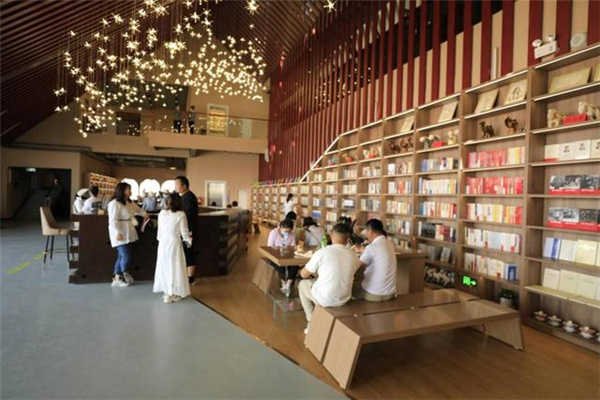Desert library offers oasis of knowledge in China's Ningxia
Xinhua | Updated: 2022-07-12 10:31

On the southeast edge of the Tengger Desert in Northwest China's Ningxia Hui autonomous region sits a new desert library, awakening the lonely land with an oasis of knowledge for book lovers, tourists, and architects.
With flowing dunes stretching spectacularly into the distance, the three-story, abstractionist-style library opened last month in Zhongwei and is an architectural success, according to Jin Weiqi, a Beijing-based photographer.
The chocolate color building looks like an inclined box half-buried in the desert. Using rusty iron sheets on its exterior to keep out desert heat, the "Lost Treasure Box" library seems like a boat stranded on a beach.
"Small light yellow flowers grow along dry branches of tenacious desert plants, and there are also traces of desert beetles climbing over dunes," Jin said.
Being able to shelve 40,000 books, newspapers, and periodicals, the library is part of an ambitious desert culture and tourism project promoted by the local government and tourism agencies in Zhongwei.
Sandwiched by the Tengger Desert, the fourth largest one in China, in the north and the Yellow River in the south, Zhongwei has been making great efforts in recent years to promote its unique culture.

"This is the first modern library ever built in the desert in China, and it started serving the public last month, winning widespread praises for its modern design and various functions," said Liu Huiling, a manager at the library.
Zhongwei has been an important border fortress in northwestern China since being incorporated into the Chinese territory during the Qin Dynasty (221 BC-207 BC).
According to Liu, the name "Lost Treasure Box" was taken as the library situates at a place where numerous important historical events took place. "With rich 'memories,' it has a lot to be tapped and told," she said.
"The library brings about a dialogue between imagination and nature. It is like a fantasied edifice in a vast desert land," said Wu Yin, an official with the publicity department of Zhongwei.

Located at the Shapotou desert resort, the library also aims to showcase reconciliation between the desert and human activities after decades of anti-desertification efforts since 1958.
The railways and highways built across the Tengger Desert have not only helped to stop the moving of the desert towards the city but also provided a solid infrastructure base for local tourism development.
Yang Fang, a visitor from East China's Fujian province, brought her 8-year-old daughter to the library, where "with stars overhead at night, my daughter can appreciate sounds of the wind in the desert while reading."
"The word Tengger means 'sky' in Mongolian," said the 35-year-old primary school teacher, adding that children curious about or fond of the desert would visit Zhongwei City in the summer holidays.
























